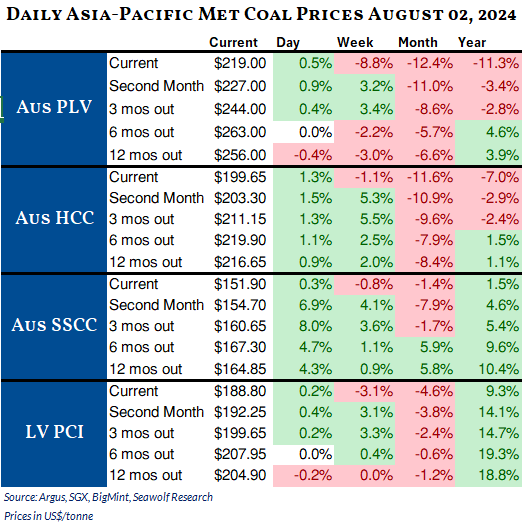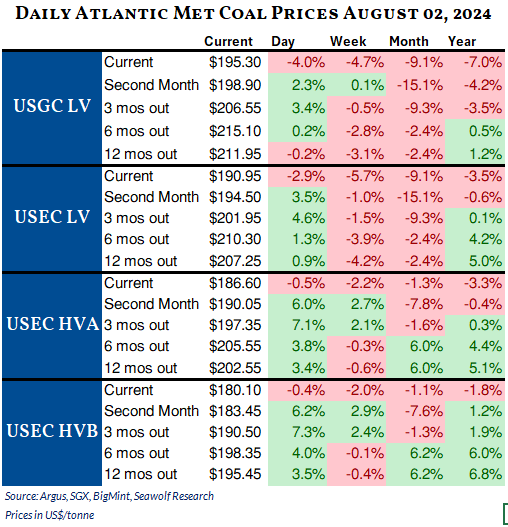

Daily Thermal Coal Prices – EOD August 2, 2024
- FOB Newcastle (6,000) (May’23) $135.29 (+1.28)
- FOB Newcastle 20% Ash (5,500) $87.80 (+0.22)
- CFR India West (5,500) $110 (unch)
- Kalimantan (4,200) $51.72 (-0.25)
- CIF ARA (6,000) (May’23) $122.45 (+6.07)
- Richards Bay (5,500) $116 (+2.50)
- Baltimore 3% Sulfur (6,000) $65 (unch)Source: ICE, BigMint
Honestly this has been the slowest two weeks of coal news I’ve seen in years. There really hasn’t been much to write about other than the absolute capitulation of met coal prices, and to be honest a lot of the cargoes that the trade rags have been using to push prices lower have been re-sales from traders. With activity finally starting to pick up, we should see the falling knife finally stick, and hopefully we will get some news to summarize for you. Until that picks up (usually in September), this news/price data correspondence will probably be weekly or perhaps twice a week.
Earnings season has finally kicked off though, and for premium subscribers, I’ve started a series of earnings previews on Substack that detail how I model companies from the ground up. Our first three estimates have all come in pretty close in terms of coal revenue and costs, which has helped to contextualize recent stock movements. AMR reports on Monday, so there will be one more piece that comes out over the weekend.
Lastly, I wanted to note that TCT Premium Members should also have access to The Coal Trader Substack, The Coal Trader Private Twitter account, and The Coal Trader **. If you don’t have access to those for some reason, ping me on Twitter and I can start getting that taken care of.
-MW/TCT
Coal News
Seaborne coking coal markets have been active of late, with prices beginning to stabilize due to trader and end-user demand. Argus’s assessment of Australian premium low-volatile (PLV) hard coking coal prices held steady at $215/t fob, with second-tier at $199/t fob. A major steel mill reportedly sold a 36,000t cargo at $215/t fob, $2/t lower than the previous day. Despite a rebound in Chinese demand, prices are expected to stay rangebound. Premium hard coking coal prices to India rose to $231.25/t cfr, while second-tier prices slightly decreased. Chinese demand remains weak, however, with domestic prices for top-grade low-sulphur coking coal dropping further.
Atlantic thermal coal prices continued to rise, tracking physical market strength and broader energy trends. European API 2 swaps increased by $1.51/t on average, with the front-month contract at $122/t and the year-ahead at $123.80/t. In the physical NAR 6,000 kcal/kg cif ARA market, September and October cargoes were bid-offered at $120.50-123/t and $121-129/t, respectively. Argus assessed the cif ARA market at $122.45/t. Heatwaves boosted European energy demand, with German coal generation spiking to 4.04GW. South African API 4 coal swaps rose by $1.84/t on average, despite low Indian demand. Argus assessed fob Richards Bay at $116/t.
Warrior Met Coal reported strong Q2 2024 results, with net income of $71 million and a significant increase in sales and production volumes despite market challenges. The company invested $84 million in the Blue Creek project, advancing its development for a 2026 production start. Total revenues beat estimates, reaching $397 million, driven by an 18% rise in sales volume. The company remains cautiously optimistic about demand growth in H2 2024, particularly in India and Southeast Asia, while continuing disciplined capital spending. Read More
Peabody Energy reported strong Q2 2024 results, beating estimates significantly with $199.4 million in net income and $309.7 million in adjusted EBITDA. The company announced an additional $100 million for share buybacks, emphasizing shareholder returns and organic growth, particularly through the Centurion project. Despite challenges like geological issues at Coppabella and the Holt Lock outage, Peabody’s strategic focus remains on operational excellence and financial stability. The Centurion project is on track for 2026 production, with significant development milestones achieved. The company remains optimistic about future free cash flow and market positioning, ensuring continued value creation for shareholders. Read More
Anglo American CEO Duncan Wanblad confirmed that the fire at Grosvenor coal mine is believed to be extinguished, with gas, temperature, and drone monitoring supporting this. Plans are underway to assess the damage, which may take time. The longwall re-start is unlikely under Anglo’s ownership, as the company is selling its Australian coal assets to focus on copper. Despite the fire adding complexity to the sale, interest from buyers remains strong. The incident began on June 29, with all 150 workers evacuated safely. Anglo American is supporting its workers with extended pay until August 31. Read More
Russian High-CV coal is expected to face a shortage in the H2 2024 global market as exports have dropped significantly due to logistical issues, international sanctions, low global prices, and high production costs. Russian coal exports fell by 8.8% in H1 2024. Limited rail shipments have reduced coal availability at Far East, North-West, and South ports. Despite high demand from Turkey and India, logistical constraints have prevented Russian exporters from meeting export commitments. This shortage and increasing demand are likely to drive up coal prices, although logistical challenges remain a major hurdle for exporters. Read More
A Conference Board report warns that rising electricity demand from data centers, driven by AI, could threaten U.S. grid reliability and slow the transition to a net-zero system. Data centers’ energy consumption could double by 2030, straining limited grid capacity. Although AI tools may eventually enhance efficiency, near-term AI demand risks outpacing these improvements. Smaller utilities and those with inadequate renewable capacity are particularly vulnerable. Locating data centers near renewable resources and utilizing nuclear power could help mitigate these challenges. Immediate solutions include energy efficiency, peak shifting, and expedited permitting for new energy projects. Read More





